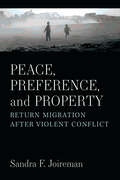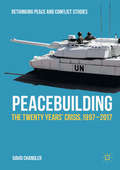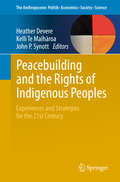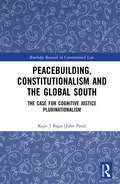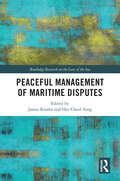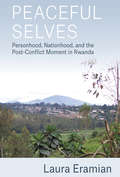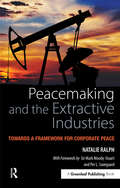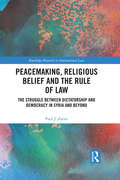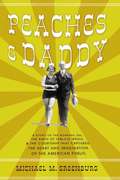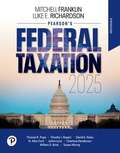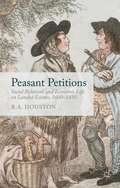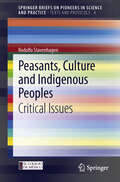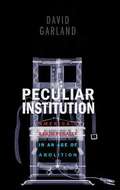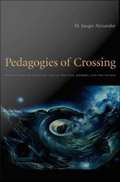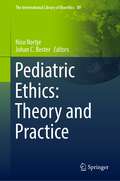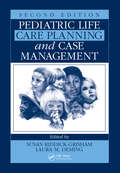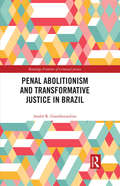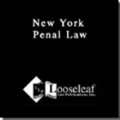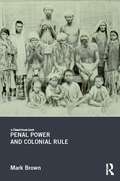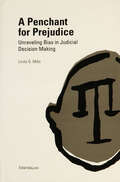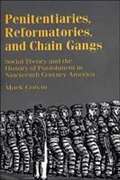- Table View
- List View
Peace, Preference, and Property: Return Migration after Violent Conflict
by Sandra F JoiremanGrowing numbers of people are displaced by war and violent conflict. In Ukraine, Afghanistan, Ethiopia, Myanmar, Syria, and elsewhere violence pushes civilian populations from their homes and sometimes from their countries, making them refugees. In previous decades, millions of refugees and displaced people returned to their place of origin after conflict or were resettled in countries in the Global North. Now displacements last longer, the number of people returning home is lower, and opportunities for resettlement are shrinking. More and more people spend decades in refugee camps or displaced within their own countries, raising their children away from their home communities and cultures. In this context, international policies encourage return to place of origin. Using case studies and first-person accounts from interviews and fieldwork in post-conflict settings such as Uganda, Liberia, and Kosovo, Sandra F. Joireman highlights the divergence between these policies and the preferences of conflict-displaced people. Rather than looking from the top down, at the rights that people have in international and domestic law, the perspective of this text is from the ground up—examining individual and household choices after conflict. Some refugees want to go home, some do not want to return, some want to return to their countries of origin but live in a different place, and others are repatriated against their will when they have no other options. Peace, Preference, and Property suggests alternative policies that would provide greater choice for displaced people in terms of property restitution and solutions to displacement.
Peacebuilding
by David ChandlerMoving beyond the binary argument between those who buy into the aims of creating liberal democratic states grounded in free markets and rule of law, and those who critique and oppose them, this timely and much-needed critical volume takes a fresh look at the liberal peace debate. In doing so, it examines the validity of this critique in contemporary peacebuilding and statebuilding practice through a multitude of case studies - from Afghanistan to Somalia, Sri Lanka to Kosovo. Going further, it investigates the underlying theoretical assumptions of liberal peacebuilding and statebuilding, as well as providing new theoretical propositions for understanding current interventions. Written by some of the most prominent scholars in the field, alongside several new scholars making cutting edge contributions, this is an essential contribution to a rapidly growing interdisciplinary area of study.
Peacebuilding and the Rights of Indigenous Peoples
by Heather Devere Kelli Te Maihāroa John P. SynottThis book analyses efforts to advance the rights of Indigenous People within peace-building frameworks: Section I critically explores key issues concerning Indigenous Peoples' Rights (struggles for land, human, cultural, civil, legal and constitutional rights) in connection with key approaches in peace-building (such as nonviolence, non-violent strategic action, peace education, sustainability, gender equality, cultures of peace, and environmental protection). Section II examines indigenous leaders and movements using peace and non-violent strategies, while Section III presents case studies on the successes and failures of peace perspectives regarding contributions to/ developments in/ advancement of/ barriers to the rights of Indigenous Peoples. Lastly, Section IV investigates what advances have been achieved in Universal Indigenous Peoples' Rights in the 21st century within the context of sustainable peace.
Peacebuilding, Constitutionalism and the Global South: The Case for Cognitive Justice Plurinationalism (Routledge Research in Constitutional Law)
by Kajit J Bagu (John Paul)This book presents the case that liberal constitutionalism in the global South is a legacy of colonialism and is inappropriate as a means of securing effective peace in regions that have been subject to recurrent conflict. The work demonstrates the failure of liberal constitutionalism in guaranteeing peace in the postcolonial global South. It develops an alternative, more compelling constitutionalism for peacebuilding in conflicted regions. This is based on constitutionalism that recognises plurality as a major feature in the global South. Drawing on events in Nigeria, it develops a constitutional model, based on Cognitive Justice, which could deliver peace by addressing historic, conceptual, legal, institutional and structural issues that have created social inequality and injustice. The study also incorporates insights from the development of plurinational constitutions in South America. The book will be an invaluable resource for researchers, academics and policy-makers with an interest in constitutional legal theory, peacebuilding and postcolonial studies
Peaceful Management of Maritime Disputes (Routledge Research on the Law of the Sea)
by James Kraska and Hee Cheol YangInternational law concerning maritime boundary dispute resolution reflects normative aspirations for peacefully managing some of the most intractable challenges in foreign affairs. Focusing on key international law issues relating to maritime boundary disputes, this book explores how international law and legal institutions facilitate these goals theoretically and practically. This process includes a balance of equities among states grounded in the Charter of the United Nations and the protection of sovereignty, territorial integrity, and political independence of Member States, while avoiding threats to the peace, breaches of the peace, and acts of aggression. The UN Charter is complemented by the rules in customary law and UNCLOS for evaluating maritime claims and addressing disputes, including conciliation, litigation, and arbitration. Despite the comprehensive nature of these procedures, numerous maritime disputes persist, including those in the East China Sea and South China Sea. As the disputes continue, however, general international law and the UNCLOS framework captures additional norms and rules that may act to reduce tension and manage disputes. As States shift closer to or farther from compliance on maritime claims and delimitation, the rules of behavior that pertain to flag States and coastal States may help to maintain the peace. This volume offers a distributed study in the factors affecting maritime disputes, international law frameworks and diplomatic models for addressing them, and legal, security, and historical dynamics in East Asia. The book goes beyond the existing debate to offer suitable methods for managing contemporary disputes and makes a meaningful impact on thinking about regional maritime security and international maritime law.
Peaceful Selves: Personhood, Nationhood, and the Post-Conflict Moment in Rwanda
by Laura EramianThis ethnography of personhood in post-genocide Rwanda investigates how residents of a small town grapple with what kinds of persons they ought to become in the wake of violence. Based on fieldwork carried out over the course of a decade, it uncovers how conflicting moral demands emerge from the 1994 genocide, from cultural contradictions around "good" personhood, and from both state and popular visions for the future. What emerges is a profound dissonance in town residents' selfhood. While they strive to be agents of change who can catalyze a new era of modern Rwandan nationhood, they are also devastated by the genocide and struggle to recover a sense of selfhood and belonging in the absence of kin, friends, and neighbors. In drawing out the contradictions at the heart of self-making and social life in contemporary Rwanda, this book asserts a novel argument about the ordinary lives caught in global post-conflict imperatives to remember and to forget, to mourn and to prosper.
Peacemaking and the Extractive Industries: Towards a Framework for Corporate Peace
by Natalie RalphPeacemaking and the Extractive Industries addresses a significant gap in research on the political and diplomatic role of multinational corporations in peace processes in intrastate conflict: Corporate Peacemaking. The author focuses on corporations in the oil and mining sectors, supporting or participating in peace negotiations and mediation. The chapters explore national-level peace processes, as well as those at community and global levels. While the focus is on extractive companies, the findings are valuable to companies from all industries looking at peace-related processes. This ground-breaking book gives a comprehensive picture of how Corporate Peacemaking currently works, how it can be developed and implemented, and how it is likely to impact global governance and corporate culture in the future. The book demonstrates that Corporate Peacemaking has the potential to be a powerful element in international governance and peace efforts; and Ralph shows through the business case that companies, as well as communities, will benefit. Ralph presents a new framework for Corporate Peace that will assist companies from all sectors in countries experiencing violent conflict, in addition to instability, human rights abuses and poor governance. Based on rigorous academic research with practical case studies, it is essential reading for practitioners, academics, policy-makers and NGOs.
Peacemaking, Religious Belief and the Rule of Law: The Struggle between Dictatorship and Democracy in Syria and Beyond (Routledge Research in International Law)
by Paul J. ZwierThis book offers a new way of understanding the role of the mediator in teaching parties the interrelationship between sustainable peace, forgiveness, and international justice. It argues that the arrival of social media presents new opportunities for reaching sustainable peace agreements, through their use in gathering the detailed information that can match victims and perpetrators of past atrocities. The author aims to advance a more expansive understanding of the subjects and limitations of making peace in the shadow of international law by examining the concepts of mediation and forgiveness that exist alongside law. To that end, the book offers an account of the role of the mediator that emerges from the interplay between Ricouerian imagination and forgiveness and predicts ever-greater opportunities for making peace and protecting human rights that can be facilitated by a harnessing of social media as a tool for making peace with justice. The author also aims to examine how strategies for sustaining the peace must combat the inevitable frustrations with democracy that can lead to a slide into dictatorship. Assad, Obama, and the UN leadership and their decisions concerning making and maintaining peace in Syria are used as case studies to examine the interplay between a leaders’ religious beliefs, faith in democracy and rule of law, and impulses towards totalitarianism.
Peaches and Daddy: A Story of the Roaring Twenties, the Birth of Tabloid Media, and the Courtship That Captured the Heart and Imagination of the American Public
by Michael M. Greenburg"Peaches & Daddy" vividly recounts the amazing and improbable 1926 marriage and legal battle between a 51-year-old Manhattan millionaire and a 15-year-old girl. Their story captured the imagination of the American public and gave birth to tabloid journalism.
Pearson Drive Right (11th Edition): Skills and Application Workbook
by Elizabeth A. WeaverPearson Drive Right (11th Edition) Skills and Application Workbook by Elizabeth A. Weaver.
Pearson's Federal Taxation 2025 Individuals
by Mitchell Franklin Luke E. RichardsonPearson’s Federal Taxation 2025 Individuals, of the hallmark Franklin and Richardson series, clearly explains the principles of taxation and the latest tax regulations. It covers all entities, with often briefer treatment than the Corporations and Comprehensive volumes. This long-trusted resource blends technical aspects of tax law with maximum readability and relevance. Hands-on practice problems will help you apply tax principles to practical accounting practices. The 38th Edition incorporates tax information from 2023 and early 2024. The new edition is a complete refresh reflecting the latest tax rulings and regulations, as well as their implications for tax law. It features an abundance of new real-world examples and significant court cases demonstrating the current tax law at work.
Peasant Petitions
by R. A. HoustonThis book examines the structures and texture of rural social relationships, using one type of document found in abundance over all the four component parts of Britain and Ireland: petitions from tenants to their landlords. The book offers unexpected angles on many aspects of society and economy on estates in the 17th and 18th centuries.
Peasants, Culture and Indigenous Peoples
by Rodolfo StavenhagenThis last volume in a trilogy published on the occasion of the 80th birthday of Rodolfo Stavenhagen, professor emeritus of El Colegio de Mexico, includes eight essays on Peasants, Culture and Indigenous Peoples: Critical Issues; Basic Needs, Peasants and the Strategy for Rural Development (1976); Cultural Rights: a Social Science Perspective (1998); The Structure of Injustice: Poverty, Marginality, Exclusion and Human Rights (2000); What Kind of Yarn? From Color Line to Multicolored Hammock: Reflections on Racism and Public Policy (2001); The United Nations Special Rapporteur on the Rights of Indigenous Peoples (2012); A Report on the Human Rights Situation of Indigenous Peoples in Asia (2007); Report on the Impact of Megaprojects on the Rights of Indigenous Peoples (2003); and Study Regarding the Best Practices to Implement the Recommendations of the Special Rapporteur (2007). These texts address human rights issues, especially those that arose when Stavenhagen was servinged as United Nations special rapporteur on the rights of indigenous peoples.
Peculiar Institution: America's Death Penalty In An Age Of Abolition
by David GarlandThe U.S. death penalty is a peculiar institution, and a uniquely American one. Despite its comprehensive abolition elsewhere in the Western world, capital punishment continues in dozens of American states– a fact that is frequently discussed but rarely understood. The same puzzlement surrounds the peculiar form that American capital punishment now takes, with its uneven application, its seemingly endless delays, and the uncertainty of its ever being carried out in individual cases, none of which seem conducive to effective crime control or criminal justice. In a brilliantly provocative study, David Garland explains this tenacity and shows how death penalty practice has come to bear the distinctive hallmarks of America’s political institutions and cultural conflicts. <p><p> America’s radical federalism and local democracy, as well as its legacy of violence and racism, account for our divergence from the rest of the West. Whereas the elites of other nations were able to impose nationwide abolition from above despite public objections, American elites are unable– and unwilling– to end a punishment that has the support of local majorities and a storied place in popular culture. <p> In the course of hundreds of decisions, federal courts sought to rationalize and civilize an institution that too often resembled a lynching, producing layers of legal process but also delays and reversals. Yet the Supreme Court insists that the issue is to be decided by local political actors and public opinion. So the death penalty continues to respond to popular will, enhancing the power of criminal justice professionals, providing drama for the media, and bringing pleasure to a public audience who consumes its chilling tales. <p> Garland brings a new clarity to our understanding of this peculiar institution– and a new challenge to supporters and opponents alike.
Pedagogies of Crossing: Meditations on Feminism, Sexual Politics, Memory, and the Sacred
by M. Jacqui AlexanderM. Jacqui Alexander is one of the most important theorists of transnational feminism working today. Pedagogies of Crossing brings together essays she has written over the past decade, uniting her incisive critiques, which have had such a profound impact on feminist, queer, and critical race theories, with some of her more recent work. In this landmark interdisciplinary volume, Alexander points to a number of critical imperatives made all the more urgent by contemporary manifestations of neoimperialism and neocolonialism. Among these are the need for North American feminism and queer studies to take up transnational frameworks that foreground questions of colonialism, political economy, and racial formation; for a thorough re-conceptualization of modernity to account for the heteronormative regulatory practices of modern state formations; and for feminists to wrestle with the spiritual dimensions of experience and the meaning of sacred subjectivity. In these meditations, Alexander deftly unites large, often contradictory, historical processes across time and space. She focuses on the criminalization of queer communities in both the United States and the Caribbean in ways that prompt us to rethink how modernity invents its own traditions; she juxtaposes the political organizing and consciousness of women workers in global factories in Mexico, the Caribbean, and Canada with the pressing need for those in the academic factory to teach for social justice; she reflects on the limits and failures of liberal pluralism; and she presents original and compelling arguments that show how and why transgenerational memory is an indispensable spiritual practice within differently constituted women-of-color communities as it operates as a powerful antidote to oppression. In this multifaceted, visionary book, Alexander maps the terrain of alternative histories and offers new forms of knowledge with which to mold alternative futures.
Pediatric Bioethics
by Geoffrey MillerThis volume offers a theoretical and practical overview of the ethics of pediatric medicine. It serves as a fundamental handbook and resource for pediatricians, nurses, residents in training, graduate students, and practitioners of ethics and healthcare policy. Written by a team of leading experts, Pediatric Bioethics addresses those difficult ethical questions concerning the clinical and academic practice of pediatrics, including an approach to recognizing boundaries when confronted with issues such as end of life care, life-sustaining treatment, extreme prematurity, pharmacotherapy, and research. Thorny topics such as what constitutes best interests, personhood, or distributive justice and public health concerns such as immunization and newborn genetic screening are also addressed.
Pediatric Ethics: Theory and Practice (The International Library of Bioethics #89)
by Nico Nortjé Johan C. BesterThis book assists health care providers to understand the specific interplay of the roles and relationships currently forming the debates in pediatric clinical ethics. It builds on the fact that, unlike adult medical ethics, pediatric ethics begins within an acutely and powerfully experienced dynamic of patient-family-state-physician relationship. The book provides a unique perspective as it interacts with established approaches as well as recent developments in pediatric ethics theory, and then explores these developments further through cases. The book first focuses on setting the stage by introducing a theoretical framework and elaborating how pediatric ethics differ from non-pediatric ethics. It approaches different theoretical frameworks in a critical manner drawing on their strengths and weaknesses. It helps the reader in developing an ability to engage in ethical reasoning and moral deliberation in order to focus on the wellbeing of the child as the main participant in the ethical deliberation, as well as to be able to identify the child’s moral claims. The second section of the book focuses on the practical application of these theoretical frameworks and discusses specific areas pertaining to decision-making. These are: the critically ill child, new and enduring ethical controversies, and social justice at large, the latter of which includes looking at the child’s place in society, access to healthcare, social determinants of health, and vaccinations. With the dynamic changes and challenges pediatric care faces across the globe, as well as the changing face of new technologies, no professional working in the field of pediatrics can afford not to take due note of this resource.
Pediatric Homicide: Medical Investigation
by Karen GriestPediatric homicide investigations are clouded by a number of factors, not the least of which is a lack of straightforward resources. The cause of death in infants and children is often subtle and difficult to establish. Designed for quick access, Pediatric Homicide: Medical Investigation provides an invaluable resource for medical examiners, police
Pediatric Life Care Planning and Case Management
by Kate M. Grady Andrew M. Severn Paul R. EldridgePediatric Life Care Planning and Case Management provides a comprehensive and unique reference that goes beyond the clinical discussion to include legal and financial aspects, life expectancy data, and assistive technology. It also includes case samples of actual plans related to specific conditions. The book is divided into five parts: Normal Grow
Penal Abolitionism and Transformative Justice in Brazil (Routledge Frontiers of Criminal Justice)
by Andre R. GiamberardinoPenal Abolitionism and Transformative Justice in Brazil discusses how penal abolitionism provides fundamental theoretical bases and practical references for the construction of a transformative justice in Brazil, supporting the claim that justice is a socially constructed conception and that victims do not unanimously stand for punishment. The book explores how the active participation of the protagonists of a conflict in a face-to-face negotiation of symbolic reparation, can produce a sense of justice without the need to punish or impose suffering on anyone. Mapping the ways that restorative justice in Brazil has distanced itself from the potential of transformative justice, to the extent that it fails to politicize the conflict and give voice to victims, the book shows how it has resulted in becoming just a new version of penal alternatives with correctionalist content. Moving away from traditional criminal justice language and also from conservative approaches to restorative justice, the author argues that the communicative potential of the transformative kind of redress can be dissociated from the unproved assumption that legal punishment is essential or even likely to achieve justice or deterrence. The arguments are grounded in the Brazilian reality, where life is marked by deep social inequalities and a high level of police violence. By providing a review of the literature on restorative justice, transformative justice, and abolitionism, the book contextualizes the abolitionist debate in Brazil and its history in the 19th century. Penal Abolitionism and Transformative Justice in Brazil is important reading for students and scholars who study punishment and penal abolitionism, to think about what it is possible to do in societies so deeply marked by social injustice and a history of oppression.
Penal Law Of New York State
by Looseleaf Law Publications Inc. StaffNYS Certified Law Book which is annually updated for accuracy.
Penal Law of the State of New York
by Looseleaf Law PublicationsThis book contains the text of the provisions of Penal Law of the State of New York.
Penal Power and Colonial Rule
by Mark BrownThis book provides an account of the distinctive way in which penal power developed outside the metropolitan centre. Proposing a radical revision of the Foucauldian thesis that criminological knowledge emerged in the service of a new form of power – discipline – that had inserted itself into the very centre of punishment, it argues that Foucault’s alignment of sovereign, disciplinary and governmental power will need to be reread and rebalanced to account for its operation in the colonial sphere. In particular it proposes that colonial penal power in India is best understood as a central element of a liberal colonial governmentality. To give an account of the emergence of this colonial form of penal power that was distinct from its metropolitan counterpart, this book analyses the British experience in India from the 1820s to the early 1920s. It provides a genealogy of both civil and military spheres of government, illustrating how knowledge of marginal and criminal social orders was tied in crucial ways to the demands of a colonial rule that was neither monolithic nor necessarily coherent. The analysis charts the emergence of a liberal colonial governmentality where power was almost exclusively framed in terms of sovereignty and security and where disciplinary strategies were given only limited and equivocal attention. Drawing on post-colonial theory, Penal Power and Colonial Rule opens up a new and unduly neglected area of research. An insightful and original exploration of theory and history, this book will appeal to students and scholars of Law, Criminology, History and Post-colonial Studies.
Penchant for Prejudice: Unraveling Bias in Judicial Decision-Making
by Linda Gayle MillsA Penchant for Prejudice combines a detailed empirical study of the decision-making practices of judges with a sophisticated theoretical argument which exposes contemporary myths about judging and suggests methods of incorporating the inevitable bias that is detected in this and other studies. Based on a unique study of the decisions of Social Security judges, the book challenges the meaning of judicial impartiality. Linda G. Mills finds that, in practice, bias is a consistent dimension of what is considered "impartial" decision-making. The results reveal that impartiality as the legal system now defines it, is itself a form of bias, and that a historically and contextually sensitive definition of bias, one which takes account of the communities and cultures that come to be judged in the legal system, must overcome the modern dualistic notion of imparitality as the exclusion of bias in order to respond to needs of the diversity of applicants and the judges who adjudicate their claims. According to Mills, the judicial bias she found reflected in her study seems not only to essentialize and stereotype applicants but also prevents judges from engaging vulnerable claimants in a way that the legal process positively demands. A Penchant for Prejudice will be of interest to students and scholars of law, judicial decisionmaking, and discrimination. Linda G. Mills is Assistant Professor of Social Welfare and Law, University of California, Los Angeles.
Penitentiaries, Reformatories, and Chain Gangs
by Mark ColvinThis book presents information on both the historical development of punishments in the US and the theoretical interpretations of these developments. Colvin (sociology, George Mason U.) examines rival theories of the transformation of punishment systems and penal practices; the rise of penitentiaries in the Northeast; the changing perception and punishments of female offenders through the last 150 years; the transformation of criminal punishment in the South; and today's corrections system.
